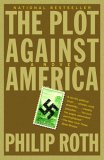Summary | Excerpt | Reading Guide | Reviews | Beyond the Book | Readalikes | Genres & Themes | Author Bio

Critics' Opinion:
Readers' Opinion:
First Published:
Oct 2004, 400 pages
Paperback:
Sep 2005, 400 pages
 Book Reviewed by:
Book Reviewed by:
BookBrowse Review Team
Buy This Book
I would have imagined Lindbergh's not mentioning the Jews in
his acceptance speech to be a promising omen, an indication that
he had been chastened by the outcry that had caused him to relinquish
his Army commission or that he had changed his mind since
the Des Moines speech or that he had already forgotten about us
or that secretly he knew full well that we were committed irrevocably
to America—that though Ireland still mattered to the Irish and
Poland to the Poles and Italy to the Italians, we retained no allegiance,
sentimental or otherwise, to those Old World countries
that we had never been welcome in and that we had no intention
of ever returning to. If I could have thought through the meaning
of the moment in so many words, this is probably what I would
have been thinking. But the men out on the street thought differently.
Lindbergh's not mentioning the Jews was to them a trick
and no more, the initiation of a campaign of deceit intended both
to shut us up and to catch us off guard. "Hitler in America!" the
neighbors cried. "Fascism in America! Storm troopers in America!"
After their having gone without sleep all night long, there
was nothing that these bewildered elders of ours didn't think and
nothing that they didn't say aloud, within our hearing, before they
started to drift back to their houses (where all the radios still blared
away), the men to shave and dress and grab a cup of coffee before
heading for work and the women to get their children clothed and
fed and ready for the day.
Roosevelt raised everyone's spirits by his robust response on learning
that his opponent was to be Lindbergh rather than a senator of
the stature of Taft or a prosecutor as aggressive as Dewey or a bigtime
lawyer as smooth and handsome as Willkie. When awakened
at four a.m. to be told the news, he was said to have predicted from
his White House bed, "By the time this is over, the young man will
be sorry not only that he entered politics but that he ever learned
to fly." Whereupon he fell immediately back into a sound sleep—
or so went the story that brought us such solace the next day. Out
on the street, when all anyone could think about was the menace
posed to our safety by this transparently unjust affront, people had
oddly forgotten about FDR and the bulwark he was against oppression.
The sheer surprise of the Lindbergh nomination had activated
an atavistic sense of being undefended that had more to
do with Kishinev and the pogroms of 1903 than with New Jersey
thirty-seven years later, and as a consequence, they had forgotten
about Roosevelt's appointment to the Supreme Court of Felix
Frankfurter and his selection as Treasury secretary of Henry Morgenthau,
and about the close presidential adviser, financier Bernard
Baruch, and about Mrs. Roosevelt and Ickes and Agriculture
Secretary Wallace, all three of whom, like the president, were known
to be friends of the Jews. There was Roosevelt, there was the U.S.
Constitution, there was the Bill of Rights, and there were the papers,
America's free press. Even the Republican Newark Evening
News published an editorial reminding readers of the Des Moines
speech and openly challenging the wisdom of Lindbergh's nomination,
and PM, the new left-wing New York tabloid that cost a
nickel and that my father had begun bringing home with him after
work along with the Newark News—and whose slogan read, "PM
is against people who push other people around"—leveled its assault
on the Republicans in a lengthy editorial as well as in news
stories and columns on virtually every one of its thirty-two pages,
including anti-Lindbergh columns in the sports section by Tom
Meany and Joe Cummiskey. On the front page the paper featured
a large photo of Lindbergh's Nazi medal and, in its Daily Picture
Magazine, where it claimed to run photographs that other papers
suppressed—controversial photos of lynch mobs and chain gangs,
of strikebreakers wielding clubs, of inhuman conditions in America's
penitentiaries—there was page after page showing the Republican
candidate touring Nazi Germany in 1938, culminating in the
full-page picture of him, the notorious medal around his neck,
shaking the hand of Hermann Göring, the Nazi leader second only
to Hitler.
>From The Plot Against America by Philip Roth. Copyright by Philip Roth 2004. All rights reserved.





The Flower Sisters
by Michelle Collins Anderson
From the new Fannie Flagg of the Ozarks, a richly-woven story of family, forgiveness, and reinvention.

The House on Biscayne Bay
by Chanel Cleeton
As death stalks a gothic mansion in Miami, the lives of two women intertwine as the past and present collide.

The Funeral Cryer by Wenyan Lu
Debut novelist Wenyan Lu brings us this witty yet profound story about one woman's midlife reawakening in contemporary rural China.
Your guide toexceptional books
BookBrowse seeks out and recommends the best in contemporary fiction and nonfiction—books that not only engage and entertain but also deepen our understanding of ourselves and the world around us.